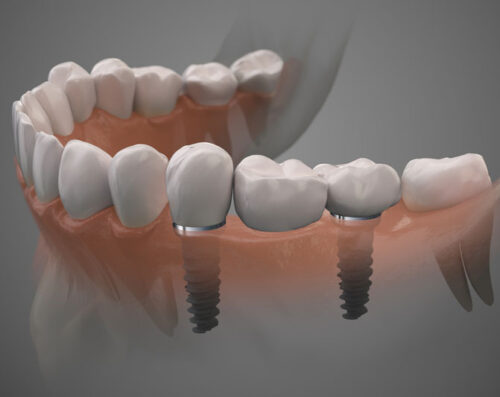
Many patients have questions about full set dental implants before deciding on treatment. This post answers the most common questions so you can understand what full-arch implant solutions are, who is a good candidate, what the process looks like, and how much it might cost. It’s for people tired of loose dentures, those with many failing teeth, and anyone exploring a long-term option to restore chewing, speech, and confidence.
What Are Full Set Dental Implants?
Full set dental implants replace an entire upper or lower row of teeth with a fixed or removable prosthesis anchored to dental implants. Instead of replacing one tooth at a time, full-arch solutions support a whole arch of teeth. Common approaches include:
- Implant-supported bridge: several implants support a single bridge that spans the whole arch.
- All-on-4 or All-on-6: four or six implants placed strategically to support a full-arch prosthesis.
- Full-arch prosthesis: custom teeth attached to implants, either fixed or removable by the dentist.
Compared to single-tooth implants, full set dental implants focus on restoring function and appearance for the entire mouth, often with fewer implants and faster recovery than replacing each tooth individually.
Who Is A Good Candidate For Full Set Dental Implants?
Not everyone is automatically a candidate, but many people can get full set dental implants with proper planning. Candidacy depends on oral health, bone quality, medical history, and lifestyle.
Oral health and bone requirements
Healthy gums and adequate jawbone volume are crucial. Over time, missing teeth cause bone loss. If bone is thin in key areas, bone grafting or sinus lifts may be needed before implants. Your dentist will evaluate gum health and remove any infected teeth or tissue before implant placement to reduce the risk of failure.
Medical and lifestyle factors
Medical conditions and habits affect healing. Controlled chronic conditions, like diabetes, often still allow implants if blood sugar is managed. Smoking reduces blood flow and slows healing, which raises the risk of implant failure. Certain medications and radiation therapy to the head or neck can affect candidacy. Your team may ask for medical clearance from your physician if needed.
What To Expect: Procedure, Timeline, and Recovery
Here’s a simple step-by-step overview of the typical process for full set dental implants:
- Initial consult and imaging: Exam, dental history, and 3D imaging (CBCT) to assess bone and plan implant positions.
- Treatment planning: Digital planning creates the guide for implant placement and the design of the new teeth.
- Implant placement: Surgery places implants into the jaw. Some patients receive temporary teeth the same day; others wait for healing.
- Healing / osseointegration: Implants bond with bone over 3–6 months. You may have a temporary prosthesis while healing continues.
- Final prosthesis placement: Once healed, the final custom prosthesis is attached and adjusted for comfort and function.
Typical timelines vary: immediate-load full-arch cases can provide teeth the same day, but final restorations usually take 3–6 months. After surgery, common symptoms include swelling, mild pain, and bruising. Care tips include soft foods at first, good oral hygiene, and following antibiotic or pain medication instructions from your dentist.
Cost, Financing Options, and Free Dental Implant Consultations
Cost for full set dental implants depends on several factors:
- Number of implants used (All-on-4 vs. All-on-6 vs. more).
- Need for extra procedures like bone grafts or extractions.
- Type of prosthesis (fixed vs. removable, materials used).
- Laboratory and technician fees for custom teeth.
Many practices offer financing plans, third-party dental loans, or payment arrangements to make treatment affordable. Dental insurance often covers part of preparatory work (extractions, some imaging) but usually does not cover the full cost of implants or prosthetics, so expect variable insurance contributions.
We offer free dental implant consultations to review your options for full set dental implants. Your free consult typically includes a clinical exam, review of x-rays or CBCT scans, discussion of treatment options, and a personalized cost estimate. If you’re ready to learn whether full set dental implants are right for you, schedule a free consultation to get a clear plan and next steps.

